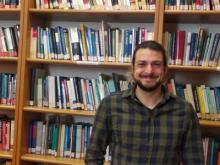Pascale, Adrián

Abogado por la Universidad de Buenos Aires. Secretario Judicial con experiencia de más de 15 años en la Poder Judicial de la Ciudad de Buenos Aires en el fuero Penal.
Magíster Interuniversitario en Criminología y Ejecución Penal por la Universidad Pompeu Fabra, Universidad de Girona, Universidad Autónoma de Barcelona y Universidad Oberta de Catalunya. Tesis final de Máster realizada sobre medios de comunicación y género "EL tratamiento mediático de la violencia contra la mujer. Una análisis del framing del caso 'Tadei' en los diarios Clarín y la Nación 2010-2016" dirigida por Daniel Varona (UdG).
Doctorando en el programa Derecho y Empresa de la Universidad de Girona. Línea de Investigación "Medios digitales, discurso de odio y democracia" dirigido por Daniel Varona.
Investigador en los proyectos: I+D del Ministerio de Ciencias e innovación "GESSUS (gestación por sustitución)"; y Ciberviolencias Machistas, del Institut Català de les Dones de la Generalitat de la Catalunya llevados a cabo por el grup de recerca Antigona de la Universitat Autònoma de Barcelona.
Actualmente, profesor asociado del departamento de Filosofía del Derecho y Criminología por la Universidad Autónoma de Barcelona en donde imparto las asignaturas: Teoría del Derecho, Protección Internacional de los Derechos Humanos , Bioethics y Gender and Law.
Ámbitos de especialidad: Derecho Penal, Criminología y Género.
The research I am to carring out is to analyze what are we talking about when we talking about hate speech and the importance of its prevention. First, analyze whether the extreme right-wing political parties in Spain use these kinds of speeches as a weapon of political propaganda. Second, in which contexts unfold, focusing on the use of social networks, specifically the attack on gender laws. The third is to analyze if this issue produces a break in democracy and if its regulation is necessary. If we take a positive answer to the first question, the investigation will propose legal and non-legal strategies to combat these kinds of speeches.
To say thank you to Susana, the Aihnoas and all the staff and members of the International Institute of Legal Sociology of Oñati for the warmth and hospitality they gave me during my stay in Oñati. I especially want to emphasize that his residence and the library provide a unique place for concentration in the study and work of many researchers who come to this magnificent site. I also want to thanks the friendship program that they carry out and that I could enjoy with the students of the master in Law sociology. In addition to being invited by Juanjo to his home in Arrasate to taste the local cuisine and chat about the life of the people of the Basque Country. Without a doubt, one of the highlights of my stay.
